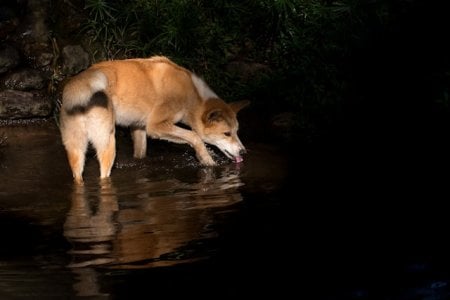This woman pays over $2,500 for doing this repeated act on popular holiday island
By
Seia Ibanez
- Replies 59
Feeding wildlife might seem like a harmless act of kindness, but for one woman, this seemingly innocent gesture came with a hefty price tag.
This incident serves as a stark reminder of the consequences of interfering with wildlife and the importance of adhering to environmental laws designed to protect both animals and humans.
On K'gari, the island formerly known as Fraser Island in Queensland, a 26-year-old woman has been fined a staggering $2580 for feeding a dingo, marking her second offence of this nature.
The incident, which was captured on a ranger's dashcam on 24 November, showed the woman tossing a small fish to a young dingo as she was fishing on the beach at Waddy Point.
While this act may appear benign to some, it is illegal and carries serious consequences. The woman admitted to the deed and was handed the maximum on-the-spot penalty.
It's worth noting that the maximum court penalty for feeding a dingo can soar up to $26,614.
But why such a hefty fine for feeding a wild animal? The answer lies in the delicate balance of nature and the safety of both humans and wildlife.
Mike Devery, a compliance manager at the Department of the Environment, Tourism, Science and Innovation, expressed frustration over the repeat offender.
‘It is frustrating to have a repeat offender on the island who doesn’t care about the safety of people or dingoes,’ he said.
'Hopefully, she has learned an expensive lesson this time, and we hope the dingo doesn't suffer any adverse effects after being fed.’
Feeding dingoes, even once, can have long-term impacts. It can teach them to associate humans with food, leading to dangerous encounters.
Habituated dingoes may approach people expecting food and can become aggressive if their expectations are not met.
This year alone, there have been 21 reported dingo attacks on K'gari.
In 2022, the same woman had been fined $413 for having food available at her campsite in the Wongai camping area.
In a previous story, a Queensland man has also been fined for feeding two dingoes in K’gari.
He was fined $2,476 by the Queensland Parks and Wildlife Service, and it noted that the incident was a ‘dangerous decision’.
 Have you ever had a close encounter with wildlife while respecting their space? Share your experiences in the comments below.
Have you ever had a close encounter with wildlife while respecting their space? Share your experiences in the comments below.
This incident serves as a stark reminder of the consequences of interfering with wildlife and the importance of adhering to environmental laws designed to protect both animals and humans.
On K'gari, the island formerly known as Fraser Island in Queensland, a 26-year-old woman has been fined a staggering $2580 for feeding a dingo, marking her second offence of this nature.
The incident, which was captured on a ranger's dashcam on 24 November, showed the woman tossing a small fish to a young dingo as she was fishing on the beach at Waddy Point.
While this act may appear benign to some, it is illegal and carries serious consequences. The woman admitted to the deed and was handed the maximum on-the-spot penalty.
It's worth noting that the maximum court penalty for feeding a dingo can soar up to $26,614.
But why such a hefty fine for feeding a wild animal? The answer lies in the delicate balance of nature and the safety of both humans and wildlife.
Mike Devery, a compliance manager at the Department of the Environment, Tourism, Science and Innovation, expressed frustration over the repeat offender.
‘It is frustrating to have a repeat offender on the island who doesn’t care about the safety of people or dingoes,’ he said.
'Hopefully, she has learned an expensive lesson this time, and we hope the dingo doesn't suffer any adverse effects after being fed.’
Feeding dingoes, even once, can have long-term impacts. It can teach them to associate humans with food, leading to dangerous encounters.
Habituated dingoes may approach people expecting food and can become aggressive if their expectations are not met.
This year alone, there have been 21 reported dingo attacks on K'gari.
In 2022, the same woman had been fined $413 for having food available at her campsite in the Wongai camping area.
In a previous story, a Queensland man has also been fined for feeding two dingoes in K’gari.
He was fined $2,476 by the Queensland Parks and Wildlife Service, and it noted that the incident was a ‘dangerous decision’.
Key Takeaways
- A woman was fined more than $2500 for feeding a dingo at K’gari, her second offence.
- Rangers caught her on dashcam throwing food to a dingo, an act which is illegal due to the risk it poses to both the dingoes and humans.
- The same woman had previously been fined for having food available in her campsite, attracting dingoes.
- Feeding dingoes can lead to them associating humans with food, increasing the likelihood of attacks, and there have been 21 dingo attacks on the island this year.








